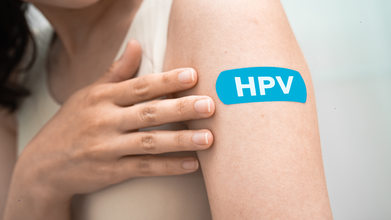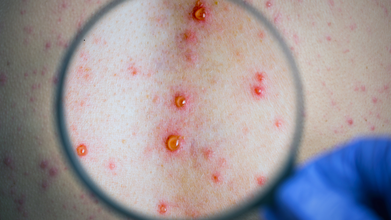- Health Conditions A-Z
- Health & Wellness
- Nutrition
- Fitness
- Health News
- Ayurveda
- Videos
- Medicine A-Z
- Parenting
Heat Waves Might Be A Fast-Forward Button On Your Ageing

Credits: Canva
As extreme temperatures rise globally, a silent danger is building—and it could be accelerating how rapidly we get older. Beyond the evident destruction of heat exhaustion, dehydration, and stress brought on by the climate, science is beginning to discover deeper, less evident harm: heat waves could be speeding up cellular aging.
With historic highs in global temperatures and rising frequency of heatwaves, particularly in the U.S. and Asia, scientists are calling for consideration at the nexus of environmental heat and epigenetic ageing.
What is Epigenetic Age?
Chronological age is the age on your driver's license, but epigenetic age is the age written far down in your cells. This scientific term tracks how old your body is biologically, based on chemical alterations in your DNA. These alterations, referred to as DNA methylation, function like switches that flip genes on and off. As we get older, these patterns change—and scientists use them to approximate biological age with instruments referred to as "epigenetic clocks."
Your epigenetic age doesn’t always match your chronological one. Influences like pollution, stress, poor lifestyle habits, and now—heat exposure—can accelerate epigenetic aging. This internal ticking clock impacts everything from how quickly your skin ages to your ability to fight disease, recover from illness, or manage inflammation.
Is Your DNA A New Risk Factor?
In 2023, a new German study published in Environment International found a strong association between heat exposure and epigenetic age acceleration. Scientists discovered that in areas where average annual temperatures were only 1°C higher, individuals exhibited evidence of accelerated biological aging.
Wenli Ni, a Harvard T.H. Chan School of Public Health postdoctoral research fellow and first author of the study, explained that heat stress affects DNA methylation patterns. These alterations can compromise gene function, accelerate aging, and cause a cascade of biological damage—particularly if the exposure is chronic.
Additionally, Taiwan studies that had more than 2,000 participants upheld the association. The increase in biological age was attributed to a rise of 1°C from the average of 180 days by 0.04 to 0.08 years. At first, it might appear negligible in the short term, but when consistent throughout years and population, it aids in premature occurrence of diseases that are related to age and makes healthcare burdens worse on a worldwide scale.
Why The Heat in 2024 Was a Tipping Point?
2024 was the hottest year ever, with almost 6.8 billion individuals facing record-breaking heat for a minimum of a month. Health professionals in areas such as India observed an influx of patients who looked physically older than their age, which sent alarm signals regarding the influence of climate on the health and lifespan of human beings.
One such U.S.-based study, published in Science Advances, looked at more than 3,500 adults older than age 56 and discovered a robust association between prolonged heat exposure (1–6 years) and cellular aging. Chronic heat not only disturbed sleep and increased levels of stress, but also played a role in biological deterioration that grew more severe with time.
The German study also emphasized that women, and especially those with Type 2 diabetes or obesity, showed stronger links between heat and increased aging. Women produce less sweat and their bodies generally take longer to trigger cooling, placing them at a physiological disadvantage during heatwaves.
Diabetics and the obese also have difficulty with heat dissipation because of decreased blood flow and insulating body fat, which complicates the release of heat from the core to the skin. These conditions further enhance the biological effect of heat, raising the risk of cardiovascular issues, kidney injury, and premature chronic diseases.
Epigenetic Impact Before Birth
Unsettlingly, even the effect of heat and climatic stress may start pre-natally. A recent research study, conducted on Kenya-based drought-stricken mothers who published their paper in Nature, suggested that intra-uterine exposure to harsh external environmental conditions contributed to hastened aging of their children.
Stress during pregnancy, water deprivation, caloric deficit, and psychogenic stress induced epigenetic changes in fetuses under development—showing that ageing might be modifiable by external surroundings even before one's life is started. All this indicates towards a dire requirement of addressing determinants of well-being, including access to nutrition, water, and gender balance, especially among climate-risk districts.
Ways to Protect Against Heat-Related Ageing
While reversing climate change will take systemic global action, individuals can take key steps to protect themselves from heat-induced aging:
1. Stay Hydrated
Dehydration is one of the most immediate risks of extreme heat. Drink water frequently—don’t wait until you’re thirsty. Carry water when heading outdoors and avoid alcohol and caffeine in hot weather.
2. Keep Cool
Use air conditioning when possible. If it’s not available, electric fans can offer relief when the indoor temperature is below 104°F (40°C). Keep your skin damp with a wet towel, mist bottle, or sponge baths. Visit air-conditioned public spaces like malls or libraries.
3. Dress Smart
Wear light-colored, breathable clothing. Avoid tight fabrics. Use wide-brimmed hats and sunscreen to protect your skin from direct sun exposure.
4. Plan Smartly
Avoid hard work between 11 a.m. and 4 p.m., the usual peak heat period. Schedule chores in the morning or evening when it's cooler.
5. Check In With At-Risk People
The most susceptible are older people, young children, pregnant women, and those with serious illness. Make sure they avoid heat and drink plenty of water when a heatwave hits.
The connection between climate and aging is no longer conjecture—it's quantifiable and based on several worldwide studies. As heat waves and frigid days become the norm, public health infrastructure needs to change by not only addressing heat as a weather phenomenon, but as a constant health threat.
Long-term solutions will require more than individual behavior. Governments and health institutions will have to prioritize heat preparedness plans, enhance urban infrastructure, and establish cooling centers. Policies specifically targeting enhancement of food security, safeguarding pregnant women, and mitigating occupational exposure to heat—particularly among women in labor-intensive occupations will be crucial.
In conclusion, if we don't take action to stem the increasing menace of heat extremes, we are likely to wind the clock forward—not only on climate, but on the human life expectancy as well. To age more quickly as a result of exposure to the environment is a brewing public health emergency and the world needs to wake up to it.
How India’s New HPV Vaccine Drive Could Prevent 80,000 Cancer Deaths Every Year

Credit: Canva
Cervical cancer is still one of the most common cancers for women in India. It's mostly caused by a persistent infection with the Human Papillomavirus, or HPV for short.
This virus spreads through sexual contact and often doesn't show any symptoms early on. A lot of women don't even realize they have the virus until abnormal cell changes start to show up.
The World Health Organization says that cervical cancer is one of the most preventable cancers if people get vaccinated and screened on time.
Also Read: Woman Lost Weight On Mounjaro But Her Breasts Didn't Stop Growing, This Is Why...
In India, thousands of women still die every year because they're diagnosed late and don't have enough access to regular screening. That's where the new nationwide HPV vaccination drive is starting to make a difference.
Let’s Talk About The HPV Vaccine
The HPV vaccine basically protects against the types of the virus that are most often linked to cervical cancer. You get it as a shot, and it works best if you get it before you're exposed to the virus, usually when you're a young teenager. But it can still help even if you get it later.
India's really pushing to get this vaccine out there, which is a big change in how they're handling public health. The idea is pretty straightforward and impactful: protect young girls before the virus can do any damage. By focusing on school-aged kids and making sure parents know about it, they're trying to fix a problem that's been around for ages.
Why Is This Drive So Important?
Cervical cancer doesn't just pop up overnight. It usually takes years for an HPV infection to turn into cancer. This long window gives us a chance to prevent it. Vaccination stops the infection at the start, and screening catches early cell changes before they get serious.
Public health experts think that if enough people get vaccinated, we could prevent up to 80,000 cancer deaths in India every year over time. That number isn't just a statistic. It's about saving the lives of mothers, daughters, and sisters with a simple preventive measure.
The vaccine has been studied a lot worldwide and has strong safety and effectiveness data. Countries with high vaccination rates are already seeing big drops in HPV infections and precancerous lesions.
Also Read: 15 States Sue Trump Administration Over Revised Vaccine Schedule
Busting Myths And Building Trust
Even though there's solid science behind vaccines, there's still a lot of wrong info out there. Some parents are concerned about safety or what might happen down the road. Others think getting vaccinated makes kids sexually active sooner, but studies don't back that up.
Getting the facts straight is super important for dealing with these worries. The HPV vaccine doesn't mess with fertility or hormones. It just teaches your body to fight off certain types of the virus.
Getting communities involved, having healthcare pros on board, and running educational campaigns are all crucial for building trust. When families learn that this vaccine can prevent cancer, more people are on board.
Beyond Shots: Screening Matters
Vaccination isn't the only answer. Women who are already sexually active still need regular cervical screening. Pap smears and HPV testing are still super important for catching things early. India's bigger plan includes making screening programs at primary healthcare centers stronger. When vaccination and screening work together, the impact gets way bigger.
Getting Closer To Wiping Out Cancer
The World Health Organization wants to get rid of cervical cancer as a public health issue this century, and India's vaccination plan fits right in with that big goal.
This isn't just about medicine; it's about really caring for women's health and stopping problems before they start. In a country where getting cancer treatment can be tough, prevention is our best bet.
Cervical cancer is mostly preventable. If we keep vaccinating, have good screening, and make sure everyone knows the facts, we could save thousands of lives every year. This campaign is a huge step towards a future where cervical cancer is rare, not something we just expect.
Lupita Nyong’o Opens Up About Fibroids Returning, Doubling 12 Years After Surgery

Credit: Instagram
Kenyan-Mexican actress Lupita Nyong’o has revealed that her fibroids have returned after undergoing surgery in 2014 -- now doubling up to 50, raising awareness about the often-overlooked health condition in women.
Speaking at the Today show, the Oscar-winning star Nyong’o said that she was first diagnosed with fibroids, a noncancerous tumor -- about 30 in number -- in 2014.
The growths made of muscle and tissue were removed with myomectomy, the fibroid-removal surgery.
However, the fibroids came back after over a decade, with the largest being the size of an orange, Nyong’o said.
She noted that the doubled-up fibroids are causing her more pain, while her treatment options remain largely the same.
“The first time I got the fibroids taken out, they took out 23,” she said on the show. “And this time, I’ve been informed two years ago that I have over 50.”
“And I’m being faced with the same options,” she added. “Surgery or live with the pain.”
Even as she is contemplating her treatment options, the A Quiet Place: Day One star opened up about feeling left alone and scared for her reproductive health during the initial phase.
She is now speaking out and connecting with other women suffering like her. Nyong’o is also advocating and raising money for scientists to research less invasive and non-invasive treatment methods for fibroids.
I was told that fibroids were something women live with. In refuse to accept that. Millions of women are suffering in silence, and we deserve better answers, better care and better options," Nyong’o wrote in a post on Instagram.
What Are Fibroids
Uterine fibroids are noncancerous growths that form inside or on the uterus. They are very common, affecting an estimated 40 to 80 percent of people with a uterus between the ages of 30 and 50.
In some cases, fibroids do not cause any noticeable symptoms, which means many people may not realize they have them. However, when symptoms are present, they often include:
- Heavy menstrual bleeding or painful periods
- Longer or more frequent periods
- Pelvic pressure or pain
- Frequent urination or trouble urinating
- Growing stomach area
- Constipation
- Pain in the stomach area or lower back, or pain during sex
Obesity and a higher body mass index (BMI) are the most common risk factors that can increase the chances of developing fibroids. Others include family history, not having children, early onset of menstruation (getting your period at a young age), and late age of menopause.
How To Treat Fibroids? Can They Recur?
There are several tests that can be done to confirm fibroids and determine their size and location.
These tests can include ultrasonography, magnetic resonance imaging (MRI), computed tomography (CT) scan, hysteroscopy, and laparoscopy.
Myomectomy is a commonly used surgical procedure to remove fibroids. There are several types of myomectomy, and they are used depending on the location of the fibroids, their size, and number.
The types of myomectomy procedures include hysteroscopy, laparoscopy, laparotomy, hysterectomy, uterine fibroid embolization, and radiofrequency ablation (RFA).
Even after a successful myomectomy, new fibroids can still develop. The recurrence risk is more common among young adults (under age 40) with many fibroids. The risk is less among people near menopause or with few fibroids.
Visit your doctor if you have:
- Pelvic pain that doesn't go away
- Heavy or painful periods that limit what you can do
- Spotting or bleeding between periods
- Trouble emptying your bladder
- Ongoing tiredness and weakness, which can be symptoms of anemia, meaning a low level of red blood cells.
Unique Symptoms Of Sepsis: What To Know About TIME

Credits: Canva
Sepsis that happened by a lick from a pet dog led to a woman losing all four of her limbs. Health and Me had previously reported that a Birmingham based woman, 56-year-old pharmacy worker Manjit Sangha caught sepsis from the lick of her pet dog. She spent her night in coma in the hospital and had to lose all her limbs. This happened because bacteria from dog's lick entered her body through a cut or a scratch. This led to sepsis, where the immune system's reaction to infection damaged the body's own tissues and organs.
This has brought a lot of attention on what sepsis is and what are the symptoms one must be aware of. As per the Sepsis Alliance, one must know about TIME to be aware of sepsis.
Unique Symptoms of Sepsis
TIME stands for temperature, infection, mental decline and extremely ill. If you notice these symptoms, rush to the hospital.
- T for Temperature: If you notice your body temperature rising or falling
- I for Infection: If you see signs or symptoms of any infection
- M for Mental Decline: If you feel confused, sleepy and difficult in rising
- E for Extremely Ill: If you feel severe pain, discomfort, shortness of breath
Unique Symptoms Of Sepsis: What To Know About Temperature
Your body temperature normally stays steady at about 98.6°F (37°C), with small changes based on activity, surroundings, and time of day. A reading of 100°F (37.7°C) or higher is considered a fever. During infection, the body often heats up to help fight germs. However, some people experience an unusual drop in temperature instead. Because of this, both a spike and a fall in temperature can be warning signs of sepsis.
Unique Symptoms of Sepsis: How To Know If You Have An Infection?
When an infection stays in one area, its symptoms usually match the site involved. A urinary tract infection may cause burning while urinating or frequent urges, pneumonia can bring cough and chest pain, and an infected cut may show redness or pus.
If the infection spreads through the body, broader symptoms like fever, tiredness, and body aches can appear. In some cases, an infection may not cause obvious symptoms at all. This is especially important to remember after surgery, medical procedures, skin injuries, or close contact with someone who is sick.
Unique Symptoms of Sepsis: What To Look Out For Mental Decline?
Sepsis can also alter how the brain functions. Some people, particularly older adults, may not develop the usual infection symptoms. Instead, they might suddenly become confused or show a sharp worsening of existing dementia. Marked drowsiness or unusual sleepiness is another common sign.
Unique Symptoms of Sepsis: Signs That You Are Extremely Ill
Many sepsis survivors recall feeling sicker than ever before. They describe overwhelming symptoms such as the most severe sore throat or abdominal pain they had experienced, along with a frightening sense that they might not survive.
Unique Symptoms Of Sepsis In Children
| A Child Who | Child under 5 (Infant) Who |
| Feels abnormally cold to touch | Is not eating |
| Looks mottled, bluish or has very pale skin | Is vomiting repeatedly |
| Has a rash that does not fade when you press it | Has not urinated in 12 hours |
| Is breathing very fast | |
| Has a convulsion | |
| Is very lethargic or is facing difficulty in waking up |
Unique Symptoms Of Sepsis In Adults
- High blood cell count
- Immature white blood cells in circulation
- Elevated plasma C-reactive protein
- Elevated procalctonin (PCT)
- Low blood pressue
- Low central venous or mixed venous oxygen saturation
- High cardiac index
- Low oxygen level
- Low urine output
- High creatinine in the blood
- Coagulation or clotting abnormalities
- Absent bowel sounds
- Low platelets in blood
- High bilirubin levels
- High lactate in blood
- Decreased capillary filling or mottling
© 2024 Bennett, Coleman & Company Limited

